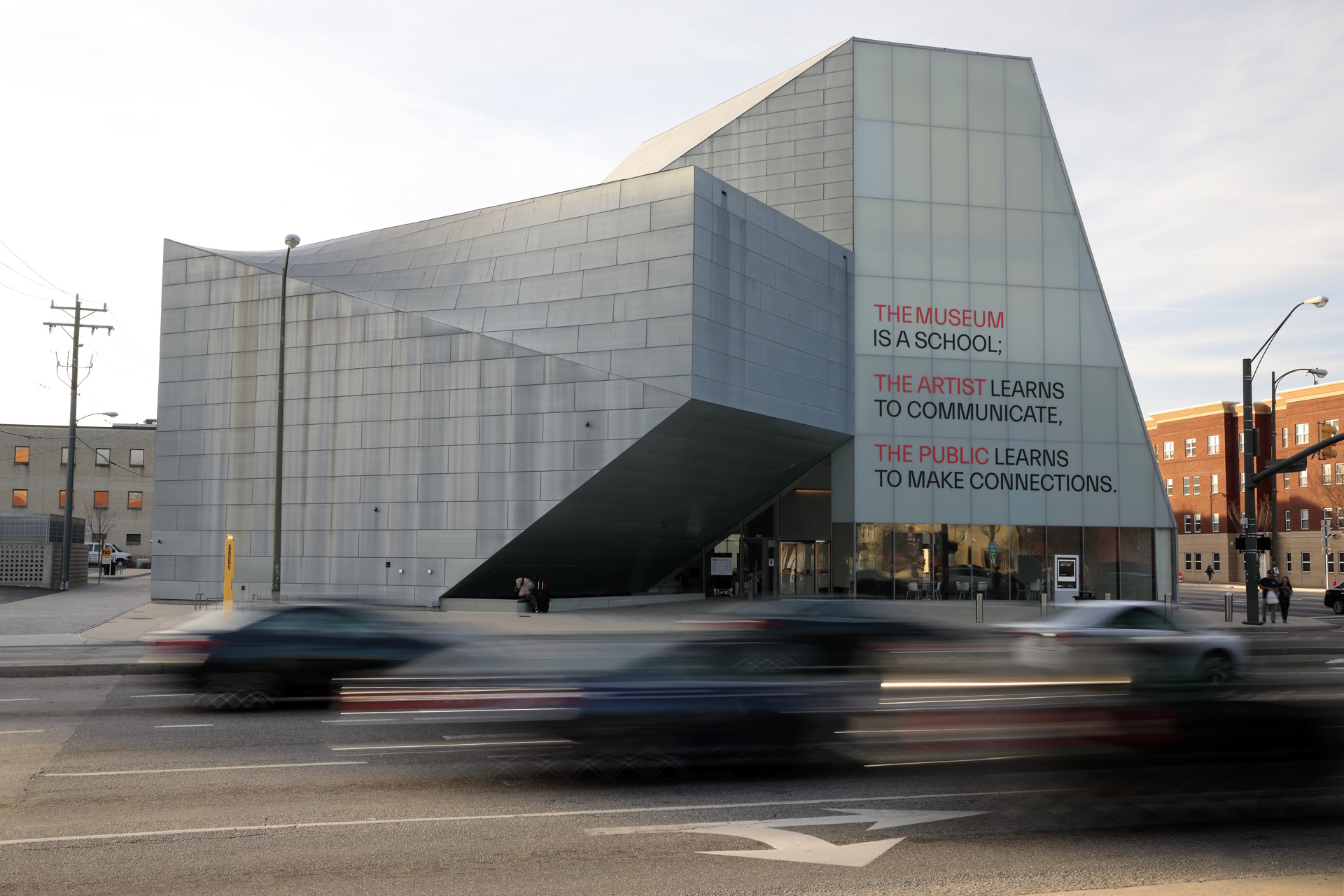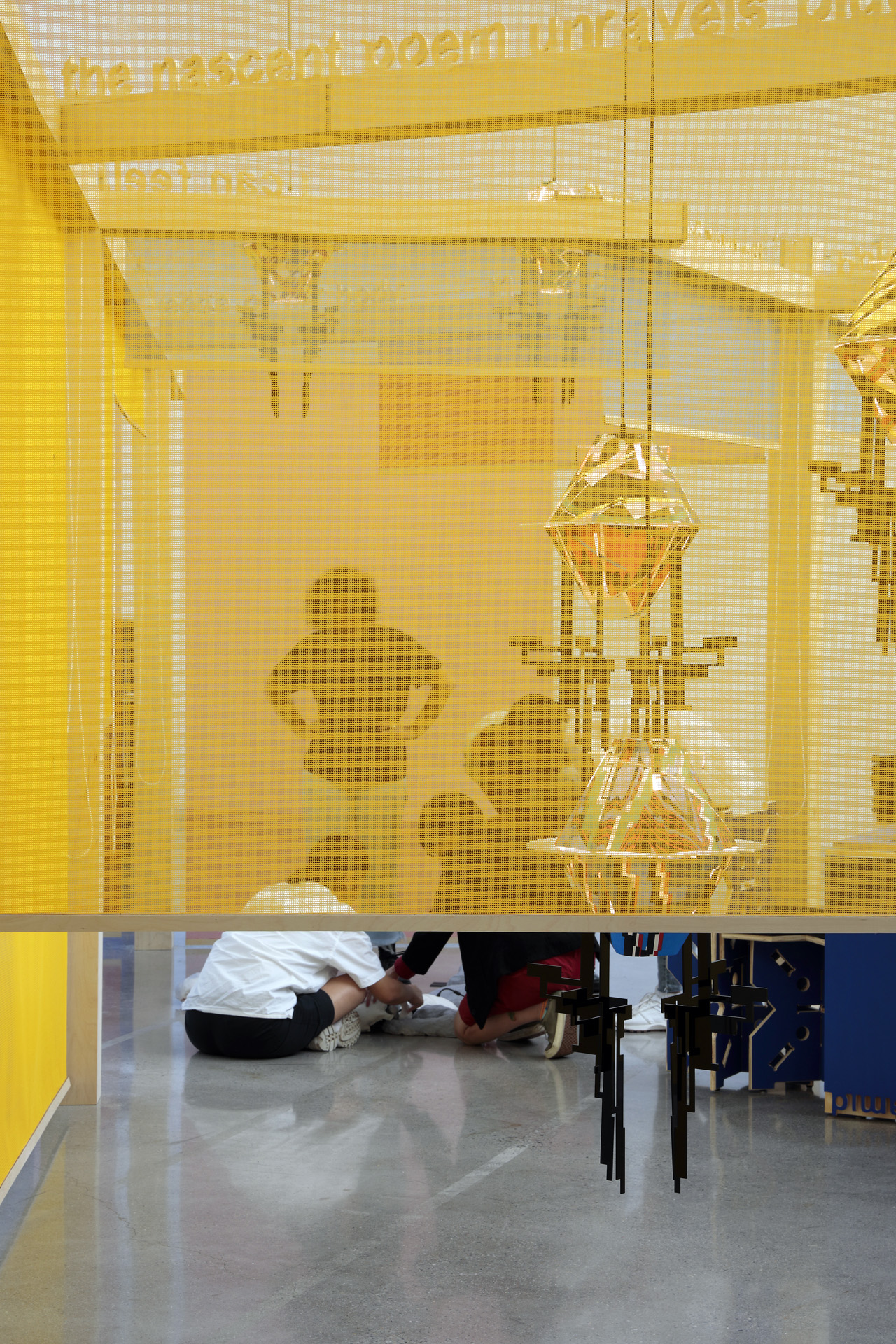Sarah Rifky, Noah Simblist, Dominic Asmall Willsdon
Institute for Contemporary Art at Virginia Commonwealth University
Sarah Rifky, Noah Simblist, Dominic Asmall Willsdon
Institute for Contemporary Art at Virginia Commonwealth University
 Installation view, Luis Camnitzer, A Museum is a School, 2009/2022. Vinyl, 3D postcard. On view at the Markel Center, Institute for Contemporary Art at VCU, Richmond, VA (Mar 12, 2022–Jan 1, 2023). © Luis Camnitzer. Courtesy of Institute for Contemporary Art at VCU. Photo credit: David Hale.
Installation view, Luis Camnitzer, A Museum is a School, 2009/2022. Vinyl, 3D postcard. On view at the Markel Center, Institute for Contemporary Art at VCU, Richmond, VA (Mar 12, 2022–Jan 1, 2023). © Luis Camnitzer. Courtesy of Institute for Contemporary Art at VCU. Photo credit: David Hale.
Between approximately 2000 and 2015, artists and educators proposed a range of alternative models of art education and art-as-education in response to institutional and sociopolitical conditions across the globe. Some reacted to the European Union’s standardization of higher education, others to the high cost of tuition in the US, and still others to the lack of formal art education institutions in much of the Global South. Curators Rifky, Simblist, and Willsdon will conduct research into those initiatives and ask which questions of art and education should be posed in the 2020s: How has the pandemic affected educational equity and the nature of learning encounters? How are new technologies impacting the shape of art education? And, crucially, what is now the role of art education amid rising anti-democratic politics, the climate emergency, and tendencies toward de-globalization?
For the curatorial team,
The ICA at Virginia Commonwealth University provides generative context for responding to these questions. The School of Arts at VCU (VCUarts) is one of the top-ranked public art and design schools in the country. It is located in Richmond, a city long synonymous with the structural injustices of the Old South but now in a social transformation due in part to the work of the cultural activists, educators, and institutions working for change over decades. Within the state of Virginia, education has historically been a political battlefield, from the state’s attempts to block school desegregation in the 1950s to today’s struggles over Critical Race Theory and parents’ rights. Responding to these local contexts and inserting them into the larger global discourse, Rifky, Simblist, and Willsdon will work with collaborators to recuperate historical tendencies, connect global conversations, and develop questions and proposals for the future.
 Installation view, Rafael Domenech, The Medium is the Massage, Institute for Contemporary Art at VCU, Richmond, VA (Sep 9, 2022–Jul 16, 2023). Courtesy of Institute for Contemporary Art at VCU. Photo credit: David Hale.
Installation view, Rafael Domenech, The Medium is the Massage, Institute for Contemporary Art at VCU, Richmond, VA (Sep 9, 2022–Jul 16, 2023). Courtesy of Institute for Contemporary Art at VCU. Photo credit: David Hale.
Sarah Rifky is ICA Senior Curator and Director of Programs. A curator, art historian, and educator, Sarah’s approach contemplates the principle that every artwork is a school. She is founder of the Imaginary School Program, an initiative of Beirut, an independent art space in Cairo, Egypt (2012–2015), a program that evolved in response to the changing state of cultural infrastructure in Egypt in the wake of the Arab uprisings of 2011. She is co-founder, with artist Wael Shawky, of MASS Alexandria (2010), an independent study and studio program for young artists. As a curatorial agent of dOCUMENTA (13), she worked with the Maybe Education team to bring thirty students from Alexandria to work in Kassel, Germany as part of the exhibition and co-hosted, with Carolyn Christov-Bakargiev, The Cairo Seminar in Alexandria (2012). Throughout her career, Sarah has developed projects with artists working on pedagogy, including Luis Camnitzer and Adelita Husni-Bey.
Noah Simblist, Associate Professor of Art at Virginia Commonwealth University, is a curator, writer, and educator. In 2016 he co-organized New Cities Future Ruins, an initiative of three universities that commissioned public projects, performances, exhibitions, and a symposium on the sustainability of rapid urbanization through America’s Western Sun Belt cities. He co-organized Tania Bruguera’s The Francis Effect (2014) and edited a related 2022 publication. As an educator he has brought MFA and BFA students to engage with alternative educational platforms such as SOMA in Mexico City, Capacete in Rio de Janeiro, and Beta-Local in Puerto Rico—all examples of pedagogical platforms that this triennial will consider. In 2019, he co-organized Summer Sessions: Commonwealth, a discursive space for public education to explore notions of the common good in Virginia, Puerto Rico, and Pennsylvania, which led into the ICA’s 2020 Commonwealth exhibition, much like the convenings planned for this triennial.
Dominic Asmall Willsdon is ICA Executive Director and Associate Professor of Art Education, Virginia Commonwealth University. His work has centered on social practice, the affinities between education and architecture, and curating education. He was formerly Leanne and George Roberts Curator of Education and Public Practice at the San Francisco Museum of Modern Art, a Pedagogical Co-Curator of the 9th Mercosul Biennial in Porto Alegre (2013), a Co-Curator of the 9th Liverpool Biennial (2016), and Curator of Public Events at Tate Modern (2000-2005). Recent curatorial projects include Public Intimacy: Art and Other Ordinary Acts in South Africa (2014), Public Knowledge (2016-19), Suzanne Lacy: We Are Here (2019), Fernanda Laguna: As Everyone (2020). Recent publications include the co-edited Public Servants: Art and the Crisis of the Common Good (MIT, 2016) and Visual Activism (Sage, 2016). He is a member of the editorial board of the Journal of Visual Culture.
Published April 5, 2023.
Sarah Rifky, Noah Simblist, Dominic Asmall Willsdon
Institute for Contemporary Art at Virginia Commonwealth University
Next up:

